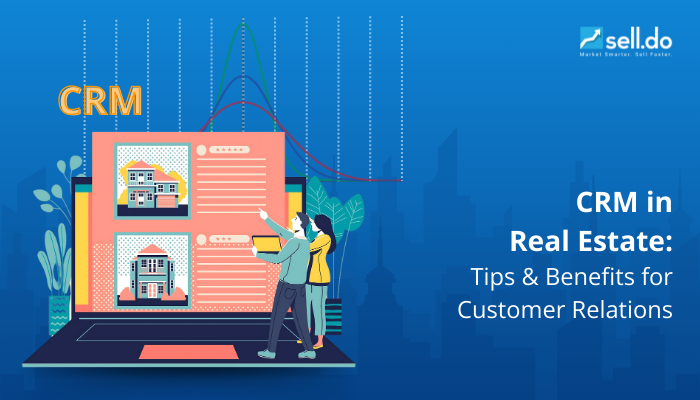Struggling to keep track of customer interactions can prevent your business from reaching its full potential. Many real estate businesses face this challenge, which results in missed opportunities and inefficient workflows.
This is where a CRM solution can help.
Customer relationship management software helps streamline operations and enhance customer relationships by centralizing customer data and automating tasks. According to a study done by Resco.net, 74% of respondents report that CRM tools give them better access to customer data, leading to more personalized service. The advantages of CRM go beyond organization—they empower you to create deeper connections and drive growth through efficient management.
So, without further ado, let’s explore the benefits of customer relationship management software to see how it can streamline your workflow and propel your business to success.
First, let’s understand how a real estate CRM works.
What is Real Estate CRM?

Real estate CRM software is a specialized application that allows you to manage client connections, property listings, and transactions on a single platform. It centralizes all client interactions, automates everyday tasks, and tracks leads, allowing brokers, agents, and developers to optimize their operations.
There are several advantages of CRM software in real estate that can help you to streamline your workflow and improve productivity. The platform assists realtors in organizing consumer data, automating follow-ups, and creating targeted marketing campaigns, allowing for more personalized communication. Additionally, a CRM delivers insights into buyer behavior, enabling you to focus on high-priority prospects and close agreements faster.
Now, let’s take a look at the benefits of customer relationship management software.
Explore our blog for detailed information on how you can Give a Boost to Your Real-Estate Business with a Real Estate CRM.
Advantages of CRM Software in Real Estate

To fully grasp the advantages of CRM in real estate, let’s dive into its specific features and explore how it addresses common challenges real estate professionals face.
-
Centralized Leads Management
A CRM system centralizes lead management by gathering and organizing all potential customer information in one accessible platform. This ensures no lead is lost and helps real estate professionals prioritize follow-ups and close deals efficiently. Here are the advantages of CRM for centralized lead management:
- Lead Capture Automation: CRM systems can automatically capture leads from several sources, including websites, social media, and email campaigns.
- Lead Scoring and Prioritization: CRM platforms assign scores to leads based on their behavior and level of interest, allowing you to focus on the most important prospects.
- Task Management and Follow-up Reminders: CRM platforms automate follow-ups by assigning reminders and tasks, assuring timely communication with leads.
- Centralized Communication: All customer interactions, including calls, emails, and texts, are stored in a single location.
- Lead Segmentation: CRM software allows you to segment leads based on various parameters (such as location, budget, and preferences).\
-
Automate Workflows
A CRM helps real estate professionals by automating workflows, allowing them to focus on more critical tasks like closing deals and building relationships. Automation streamlines repetitive processes, improving efficiency and reducing the chances of human error. Below are the advantages of CRM to automate workflows:
- Automated Follow-ups: CRM systems send clients automatic reminders and follow-up emails, ensuring consistent communication without manual effort.
- Task Assignments: Automatically assign tasks to team members based on the sales pipeline stage, ensuring no task is overlooked.
- Document Management: Automates storing and sharing important documents like contracts, ensuring timely access to all necessary files.
- Email and SMS Campaign Automation: It can send personalized marketing campaigns to targeted leads, maintaining engagement throughout the sales journey.
- Appointment Scheduling: CRM tools can automatically schedule appointments and set meeting reminders, saving time and reducing administrative burden.
 Recommended Read :
Recommended Read :CRM in Real Estate: Tips and Benefits for Customer Relations
-
Improved Customer Relationships
One of the biggest advantages of CRM is that it helps to improve customer connections by streamlining communication and providing tools to help real estate professionals stay in touch with clients more effectively. With a CRM system, you can offer personalized service that fits your customers' needs by centralizing communication and providing insights into customer behavior. Here's how a CRM can improve customer relationships:
- Multichannel Communication: CRM systems consolidate interactions from various channels—email, phone calls, social media, and SMS—into one platform.
- Scheduled Visits and Appointments: CRMs allow users to schedule property visits, meetings, and follow-ups effortlessly.
- Behavior Analysis: CRM software helps agents tailor their communication to each client’s specific needs by analyzing past interactions and buying preferences.
- Automated Reminders: CRM systems send automated reminders for follow-ups and meetings, ensuring that agents never miss an important opportunity to connect with clients.
-
Transaction Management
A CRM plays a crucial role in transaction management, simplifying the complex process of handling real estate deals. Automating and organizing tasks, CRMs help real estate professionals streamline transactions from start to finish. Below are the benefits of CRM software for transaction management:
- Document Management: CRMs store all transaction-related documents—contracts, agreements, and property listings—in one place.
- Task Automation: CRM tools automate tasks such as setting deadlines, reminders, and follow-up actions, ensuring no step in the transaction process is missed.
- Timeline Tracking: CRMs help agents track essential milestones throughout the transaction process, from the initial offer to closing, keeping everything on schedule.
- Collaboration: CRM platforms make it easy for multiple stakeholders—agents, clients, and service providers—to collaborate by sharing updates, documents, and tasks in real-time.
-
Analytics and Insights
A CRM gives valuable analytics and insights to real estate agents, giving them a competitive advantage by converting raw data into usable information. These insights are one of the primary advantages of CRM in the real estate market, assisting you to optimize plans and drive growth. Here's how CRM analytics can help real estate professionals:
- Lead and Sales Performance Tracking: CRM systems generate detailed reports on lead sources, conversion rates, and sales performance.
- Customer Behavior Insights: By analyzing client interactions and buying behavior, CRM tools help agents predict future trends and tailor their communications.
-
Improved Profitability
A CRM significantly enhances profitability by helping you identify valuable customers and streamline operations. One of the major advantages of CRM is that it enables you to optimize costs while maintaining strong customer relationships. Here’s how CRM boosts profitability in real estate:
- Identifying Profitable Customers and Optimizing Costs: A CRM helps you pinpoint which customers will most likely generate the highest returns by analyzing their purchase history and engagement levels. This allows you to focus your efforts and resources on high-value clients while identifying areas where you can cut unnecessary costs.
- Sustaining Customer Interest and Loyalty: A CRM keeps your clients engaged and satisfied by automating personalized follow-ups and providing timely information. This increases repeat business and client retention, leading to long-term profitability.
-
Scalability
A CRM system is essential for your real estate company to grow effectively. Managing leads, customers, and transactions gets more difficult as your company expands, but a CRM offers the organization and automation required to meet rising demand. Here's how a CRM supports scalability:
- Handling More Leads: A CRM helps you manage an increasing volume of leads by automating lead capture, nurturing, and follow-ups.
- Seamless Team Expansion: As your business grows, a CRM enables smooth onboarding for new team members by giving them access to all necessary data, tasks, and customer interactions in one place.
The advantages of CRM software in real estate are undeniable. From streamlining lead management to enhancing customer relationships and optimizing team productivity, a CRM is essential for real estate professionals looking to scale their business and boost profitability. And if you’re looking for a CRM with such dedicated features for the real estate industry, we suggest you take a look at Sell.Do!
If you have difficulty getting leads, check our blog How to Generate Real Estate Leads as a New Agent: Strategies and Tips for innovative ideas you can implement in minutes!
Check Sell.Do - India’s Best Real Estate CRM!

Sell.Do is an integrated CRM platform specifically designed for the real estate industry, catering to brokers, developers, and agencies. It is built to handle the unique challenges of real estate professionals by offering features that streamline client interactions, lead management, marketing, and sales processes. Unlike generic CRM software, Sell.Do focuses on automating real estate-specific workflows, ensuring that professionals can efficiently manage properties, leads, and transactions all in one place.
Key Features of Sell.Do- Marketing Automation: Sell.Do automates marketing tasks such as email campaigns and SMS follow-ups, freeing up agents to focus on client relationships.
- Pre-Sales Management: Easily track and manage your pre-sales pipeline, follow up with leads automatically, and gain insights into prospect engagement to prioritize high-interest buyers.
- Sales Management: Monitor every stage of the sales process with real-time data and performance tracking, helping sales teams close deals more efficiently.
- Channel Partner Management: Improve collaboration with channel partners by centralizing communication and providing visibility into sales data.
- Post-Sales Management: Streamline post-sales activities like contract management and document storage to ensure a smooth handoff after closing deals.
The advantages of CRM with Sell.Do go beyond just organizing data. Sell.Do helped CasaGrand secure 400 bookings in just one month—half of which came directly from CRM data! Impressive, right? That’s the power of using a real estate CRM strategically. Now imagine what you could achieve with the same kind of support. Connect with us, and let’s make it happen!
Conclusion
Implementing a real estate CRM is essential for managing customer relationships effectively, streamlining operations, and driving growth. The advantages of CRM—from automating workflows to providing valuable insights—make it a crucial tool for businesses looking to enhance productivity and improve customer retention.
For real estate businesses, in particular, a specialized CRM like Sell.Do offers tailored solutions that cater to the industry's unique challenges. It has features such as lead management, sales tracking, and post-sales support, Sell.Do ensures you’re managing your clients and building stronger, more profitable relationships.
Request a demo now to see how we can help!




Leave a comment
Comments (0)
Be the first one to comment.